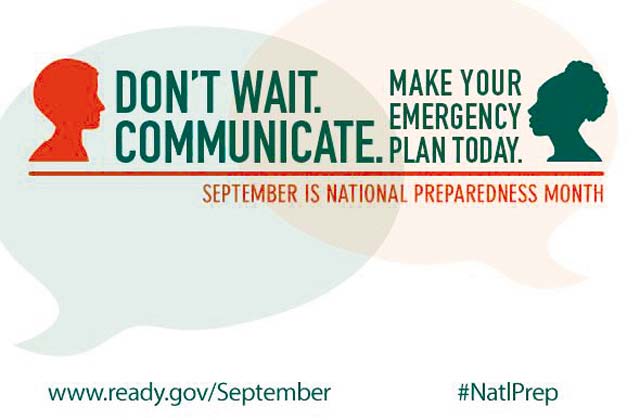
The Air Force is encouraging Airmen and their families to focus on emergency planning in September as part of National Preparedness Month. This year’s theme is “Don’t wait. Communicate. Make your emergency plan today.”
TYNDALL AIR FORCE BASE, Fla. — September is National Preparedness Month and the Air Force Civil Engineer Center is leading the charge for servicewide participation.
With a theme of “Don’t wait. Communicate. Make your emergency plan today,” this year’s focus is on emergency planning, including development of evacuation plans and family communication plans in the event of separation.
“Preparedness is the shared responsibility of our entire nation,” said Deputy Secretary of Defense Robert Work. “Preparing individuals, families, components and installations for disasters and emergencies, from flooding to an active shooter, ensures the strength of our workforce and our ability to continue to safeguard U.S. security.”
During the month, each week will be focused on planning for a specific hazard: flooding in week one; wildfires in week two; hurricanes in week three: and power outages in week four. The month culminates in National PrepareAthon Day Sept. 30.
“September 1 through 29 is more for passing out information through pamphlets or commander’s calls or other avenues bases might use,” said James Martin, emergency management education and training analyst in AFCEC’s Readiness Directorate. “On National PrepareAthon Day Sept. 30, we want to see bases actually conducting an activity. It could be table-top exercises, drills or a wide range of other activities.”
To lessen the workload on base-level emergency management offices, emergency management experts at AFCEC put together a marketing guide with links to social media posts, graphics and techniques to disseminate information effectively throughout the month.
“The emphasis should be to increase the comprehensiveness of your campaign, engaging all members of your community and highlighting the importance of preparedness, not just during National Preparedness Month, but year round,” said Harley Connors, AFCEC emergency management division chief.
All Air Force bases are encouraged to participate in National Preparedness Month and National PrepareAthon Day.
“It’s important to have time set aside that focuses on preparedness because when people have the right information, they generally do the right thing when the real emergency happens,” Martin said. “It literally translates into saving lives.”


